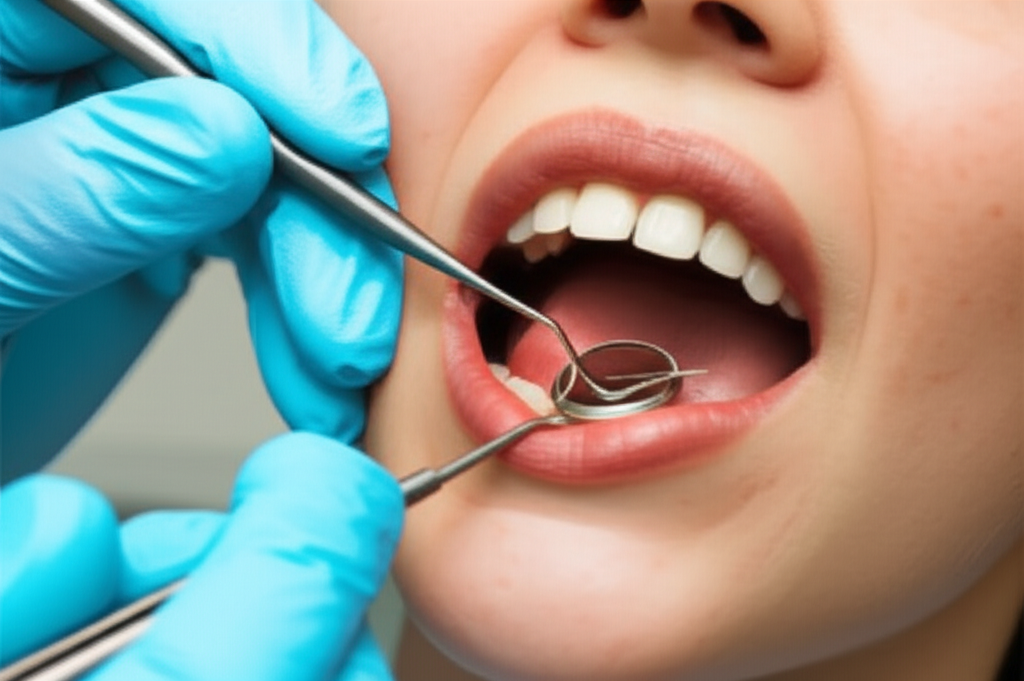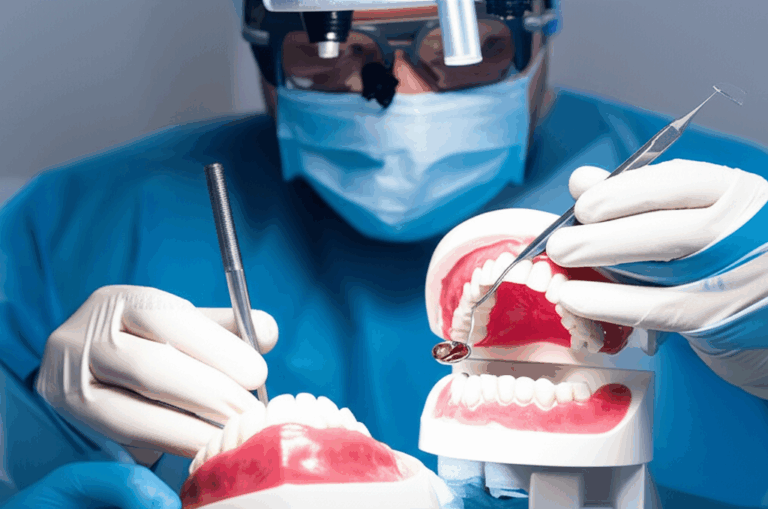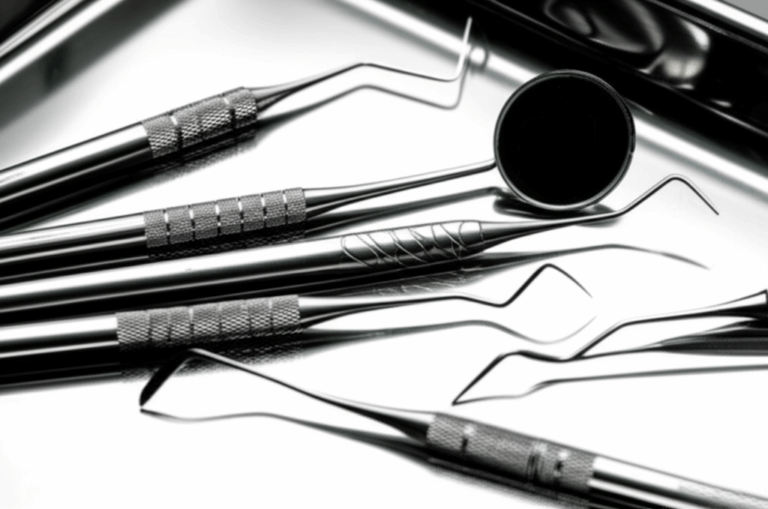
Can Your General Dentist Perform Gum Surgery? Understanding Roles & When to See a Specialist
If you’ve ever wondered, “Can my dentist do gum surgery?” this article explains it all in plain words. You’ll learn what dentists and periodontists (gum doctors) really do, how they work together, and where you can get the best care for your gums. You’ll see when your regular dentist can help, when you need a gum expert, and what gum surgery is really like (it’s not as scary as you might think!). Having healthy gums means a healthier, happier smile for you.
Table of Contents
Why Do People Ask About Dentists and Gum Surgery?
Here’s the issue: your gums are sore or bleed a little. Maybe your dentist says you need “gum work” or even “gum surgery.” But you’re confused. Can your regular dentist do this? Or do you need a different expert? Will it cost more if you see someone else?
Lots of people have worried about this. We all like to stick with the dentist we know and trust. But, like with doctors, dentistry has special kinds for different problems. Getting the right care saves pain, time, worry, and money.
Here’s help: This page explains who does what for gum problems, so you can always know where you stand!
What Does a General Dentist Do for Gum Health?
When you hear “dentist,” you think of the person who cleans your teeth and looks for cavities. That’s right. But general dentists do lots more. They’re like the leader for your mouth health, making sure everything works as it should.
Here’s what general dentists do for your gums:
- Check-Ups: Look for early gum problems (like red or swollen gums) when you visit.
- Cleanings: Remove sticky stuff and hard build-up that make gums sick.
- Teach You: Show you how to brush and floss better. Most gum issues happen from missed spots!
- Non-Surgical Care: They do deep cleaning under the gums (scaling and root planing).
- Start Treatment: Fix simple gum problems before they turn serious.
Why care? Studies say almost half of grownups over 30 have some gum sickness. Your main dentist is the first person who can spot and help with it.
> Tip: If your dentist finds stubborn tartar, puffy gums, or a little blood when you brush, don’t freak out. You’re finding things early, and that’s the best time to fix it.
What Is a Periodontist? The Gum Surgery Specialist
When gum trouble is bad, another kind of dentist jumps in: the periodontist. They’re the gum and bone doctors.
What’s a periodontist?
- A dentist with about 3 extra years of training just for gum disease and surgeries.
- An expert at fixing big gum problems, rebuilding bone, and putting in fake roots (implants).
- Knows how to use special tools, gum patches (grafts), and laser treatments.
Why do they matter? If your gum disease is bad—deep holes, wiggly teeth, bone going away—only a periodontist has the skills and know-how to save your smile. They often work with places like a china dental lab so your teeth and gums look and work great.
> Fun Fact: The American Academy of Periodontology says periodontists help people keep their own teeth as long as they can.
Can a General Dentist Treat Gum Disease?
Let’s be honest: can your own dentist help with sore gums or stinky breath?
YES—for small and early problems. Here’s how general dentists help:
- Catch Early Gingivitis: The first stage of gum disease. Dentists stop it from spreading.
- Scaling & Root Planing: A deep cleaning below the gumline.
- Germ Killers: Sometimes they use special rinses or pills for infection.
If it’s not better soon, they’ll mention a “referral.” That means, “Let’s call in a specialist for extra help.”
Quick Story: Someone I know waited too long for help with bleeding gums. By the time he saw his dentist, he had early bone trouble. A deep cleaning helped at first, but when things didn’t fully heal, his dentist sent him to a periodontist. That teamwork saved his teeth!
Which Gum Surgeries Can a General Dentist Perform?
General dentists learn lots in school. They can fix many gum troubles, if the problem isn’t really deep or hard. Here’s what they might do—especially if they’ve had extra training:
What General Dentists Might Do:
- Deep Cleanings (Scaling and Root Planing): The top way to fix early gum trouble.
- Trim Extra Gum (Gingivectomy): Cut off a bit of gum that grew too much, usually for looks. Some dentists do this for small cases.
- Small Shaping: Smooth little rough spots on gums if needed.
But if you need bigger help—like bone loss, big infections, or gums pulling way back—you need a periodontist. They’re the ones for harder repairs, more serious surgeries, or bone work.
> Table: Who Does What?
| Procedure | General Dentist | Periodontist |
|---|---|---|
| Regular Cleaning | ✓ | ✓ |
| Deep Cleaning (SRP) | ✓ | ✓ |
| Minor Gingivectomy | ✓ | ✓ |
| Flap Surgery | ✓ | |
| Gum Grafting | ✓ | |
| Bone Grafting | ✓ | |
| Crown Lengthening | Sometimes | ✓ |
| Dental Implants | Sometimes | ✓ |
*SRP = Scaling and Root Planing
When Should You See a Periodontist?
Sometimes your regular dentist says, “You should visit a specialist now.” Here’s when—and why—you’ll be glad you did.
Red Flags:
- Deep Gum Spaces: If your dentist finds spaces over 5 mm at your check-up.
- Bad Bone Loss: Seen on x-rays.
- Receding Gums: Roots start to show and might feel sensitive or look longer.
- Loosened Teeth: A big warning sign.
- Gums That Bleed or Hurt a Lot: Stays even after regular cleaning.
- Extra Health Problems: Things like diabetes, heart troubles, or being pregnant can make gums worse. Specialists are best for that.
- Deep Cleanings Don’t Help: No better after treatment.
If your dentist says “referral,” don’t put it off. Periodontists have special skills and tools that regular dentists don’t—like bone and gum grafts, laser help, and surgeries.
Types of Gum Surgery: Who Does What?
Not all gum jobs are the same! Here’s how they break down:
Gum Procedures General Dentists CAN Do:
- Deep Cleanings (Scaling & Root Planing): Good for early problems.
- Small Gingivectomy: For little overgrown areas or touch-ups.
Gum Surgeries Only Periodontists SHOULD Handle:
- Flap Surgery: For cleaning out deeper infection and fixing bone.
- Gum Grafting: Covers teeth roots using gum from your mouth or a donor.
- Bone Grafting: Adds bone where you’ve lost it—helps save your teeth.
- Guided Tissue Fixing: Helps gums and bone grow back new tissue.
- Crown Lengthening: Removes gum or bone to show more of the tooth, sometimes needed before a big filling or cap.
- Laser Gum Surgery: Heals faster and bleeds less, but needs special skill.
- Implant Placement: Many periodontists work with a digital dental lab for great results.
Remember: Advanced gum surgery is not simple. Periodontists go to school longer and do harder gum jobs. That’s why your dentist sometimes sends you to them—they just want you to get the best help.
Gum Surgery Costs and Insurance: What Should You Know?
Gum surgery isn’t only about health—money counts, too. Here’s what you should know.
Average Costs:
- Deep Cleaning (Scaling & Root Planing): $200–$600 per part of your mouth.
- Gum Surgery (Flap, Grafts): $500–$1,500+ per part.
- Gum Grafting: $600–$1,200 each spot or tooth.
Why Prices Change:
- Specialist or Not: Periodontists cost more than regular dentists.
- Type of Work Done: Special tools, lasers, or grafts cost more but may work better.
- Location: Big city dentists often cost more.
Insurance Basics:
- Most dental insurance pays for some basic gum care.
- Surgery may cost extra. Always ask your insurance about “gum disease treatment.”
If you’re worried about cost, talk to your dentist’s team. They’ll explain your choices and might help you find good prices.
What Happens Before, During, and After Gum Surgery?
If you hear the word “surgery,” it may sound scary. Here’s what’s really done.
Before Surgery:
- Check-Up: X-rays and gentle measuring of your gum problem.
- Choices: The dentist tells you what can be done and answers your questions.
- Get Ready: Brush well, maybe pause some medicines. You’ll get a list of things to do.
During Surgery:
- Numbing: They use numbing medicine, so no pain.
- The Work: The gum doctor cleans out sick tissue, sometimes puts in new gum or bone.
- Stitches: A few small, dissolving stitches are put in if needed.
After Surgery:
- A Bit Sore: Most people feel a little sore for a few days.
- Easy Care: Gentle brushing, soft food, special rinse.
- Return Visits: Dentist checks to see how you’re healing.
Most people get better fast—especially if they follow all the care tips!
How to Keep Your Gums Healthy and Avoid Surgery
Stopping gum problems is always the best move! Healthy gums save you from pain, cost, and tricky surgeries.
Here’s what works best:
- Brush twice a day: Soft toothbrush, gentle circles right up to your gumline.
- Floss once a day: Gets rid of sticky stuff between your teeth.
- Dental Visits: Go twice a year for cleanings (or more, if your dentist says so).
- Don’t smoke: Smoking hurts gums and slows down healing.
- Eat crunchy fruits and veggies: Help clean teeth while you chew.
If you’ve had gum trouble before, you might need check-ups more often—ask your dentist what’s best.
FAQs About Dentists and Gum Surgery
Q: Can my family dentist fix my gum problems?
A: For the early stuff, yes! For tricky surgeries, you’ll need a gum expert.
Q: Does gum surgery hurt?
A: They numb your mouth, so you should feel only mild aching after.
Q: How long for gum surgery to heal?
A: Most people feel better in 1–2 weeks. Tougher cases need longer.
Q: What if I ignore gum problems?
A: Could lead to bone loss, loose teeth, bad breath, and tooth loss.
Q: Does insurance pay for gum surgery?
A: Sometimes. Regular treatment is more likely covered than bigger surgeries—ask your plan!
Key Points to Remember
- Your main dentist is good for gum care and early fixes.
- Periodontists do bigger repairs and all hard gum surgeries.
- Fix gum problems early for easier, cheaper care.
- Your dentist, gum expert, and dental labs help you get the best result.
- Keep gums healthy: brush, floss, see your dentist.
- Always ask questions if you’re not sure—your team wants to help!
Take care of your gums now, and your smile will thank you for life!








